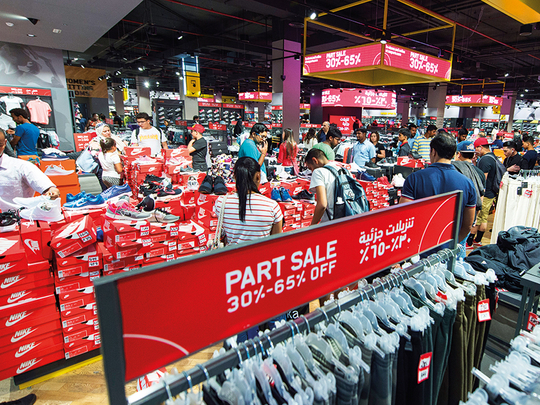
Dubai: Retailers are in a buoyant mood in the final week before the implementation of VAT (value-added tax) on January 1. They say December has seen higher sales than the last few months.
Stanly Joseph, group area manager at Al Rais Group, said that many people have been buying home and kitchen appliances. He said people are not thinking about VAT when they buy, but they are being tempted to buy because of the bundle offers and discounted prices. “There are few more days for the year and we expect the buying power to continue,” he said.
Nadeem Khanzadah, head of omnichannel retail at Jumbo Electronics, also said December has been a very good month. “People are buying laptops, TVs, smartphones, fridges, ACs and home appliances. It was anticipated that this would happen during the pre-VAT period,” he said.
Even though 5 per cent is not a big levy, psychologically, he said that people think it is better to buy now. “The first 25 days of this month have been good and we anticipate the next few days are also going to be better. We expect January to be good due to Dubai Shopping Festival as tourists are in town. What is not clear is how February and March will pan out. We anticipate a fall in sales during these months and will get a clear impact of VAT after post-DSF and after tourists go back home,” he said.
According to the latest statistics from research firm International Data Corporation’s, the introduction of the VAT is expected to have a negative impact on smartphone shipments to the UAE and Saudi Arabia during the first half of 2018, with these two markets set to experience a combined 10.1 per cent decline when compared with the same period of 2017.
Analyst Bill Carter of Autodata Middle East said that a large number of consumers are also buying cars to beat the VAT. So, the car sales have been better in the last quarter. “What the traders are doing is that they are cannibalising the 2018 sales and bringing it forward,” he said.
In 2016, Carter said that the UAE car market was down 25 per cent year-on-year. This year, it is down 15 per cent. There has been a slight recovery in the last two quarters and he credits the pre-VAT rush for lifting sales.
Nikola Kosutic, head of research at Euromonitor International, said more expensive items such as consumer electronics and appliances would be the most affected by VAT, as consumers are going to be rushing to buy them ahead of January 1.
“What we will see is that during the week before VAT implementation, people will be stocking up on items they buy on a regular basis, and that can be anything from groceries to your favourite non-grocery items, household hygiene, and these kinds of things,” he said.
VAT will the second major tax implemented in the UAE, following the excise tax earlier this year that raised the prices of tobacco products and energy drinks by 100 per cent and prices of carbonated drinks by 50 per cent.
Kosutic said that much like the buying-in-bulk ahead of the excise tax, consumers will be stocking up on products ahead of VAT’s roll-out, even though VAT is just at 5 per cent.
“It’s not about the amount. From a consumer behaviour perspective, it’s not about how much you will save; it’s about whether you can save or not,” he said.
Similarly, a spokesperson from LuLu Hypermarket said the chain has seen a 20 per cent year-on-year increase in December in the sales of gadgets, electronic devices, and electronic accessories.
The spokesperson said, however, there was “no manic buying,” and that a lot of people were spending more during the month because of the festive season.
“The Dubai Shopping Festival kicked in on the 26th. Retailers always have promotions during this period, and that drives sales,” the spokesperson said.












